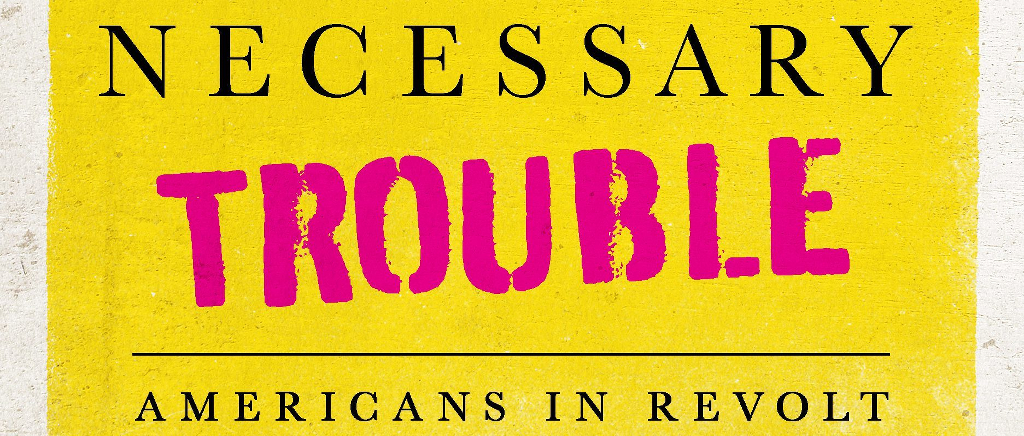Labor journalist Sarah Jaffe has covered a myriad of topics in her work, ranging from “trickle-down feminism” to tenants’ rights to popular culture—and her first book, Necessary Trouble, proves that she’s an important voice in the post-2008 activist landscape. Taking its name from a quote from Representative John Lewis, Necessary Trouble is a vital chronicle of current political activism spearheaded by ordinary Americans.
The activist movements that Jaffe chronicles in Necessary Trouble do not only take place in the expected leftist coastal enclaves; although there is a chapter devoted to Occupy Wall Street, one of Jaffe’s most salient points in the book is that activism and the fight for a better America have been taking place all over the United States. This current activism, galvanized by the 2008 financial crisis, has also caused groups that otherwise might not work together to form coalitions on intersectional issues—as Jaffe puts it in her chapter on the populist responses to the 2008 crisis and bailout:
[For] many others, the financial crisis and the resulting precipitous drop in living standards for so many people taught a different lesson: that if the actions of people far away from us can wipe out 40 percent of our wealth in such a brief period of time, perhaps we have more in common with the people we thought below us than previously imagined.
Necessary Trouble’s accounts of activist communities coming together also cover the efforts of organizations such as Occupy Homes (an offshoot of Occupy Minnesota that assists homeowners whose homes are in foreclosure), OUR Walmart (a national organization that fights for various changes for Walmart workers), Black Lives Matter and the organizing efforts in Ferguson, Missouri, and the Moral Monday organizing and assemblies in Raleigh, North Carolina (in favor of voting rights, racial justice, and against fracking and cuts to social services, among other issues) led by progressive faith leaders. Later chapters connect the late-1950s “red scare,” fears of Communism and how it manifests currently in fears of liberal radicalism, and the ongoing militarization of the police across the country to the federal, state, and local government responses against these protest movements—and why these tactics concern activists.
Jaffe’s analysis particularly excels when she writes about the history of union organizing, workers’ rights, and activist movements for gender, racial, and sexual minorities’ equality, as well as concepts including neoliberalism; what distinguishes Necessary Trouble from many books on leftist organizing and associated histories is that Jaffe takes care to situate such historical context into her chronicle of recent populist activism regarding similar issues. It’s refreshing to read an account of current events that takes both the history of organizing and intersectionality seriously, and the connections she draws between social, economic, and political issues across the spectrums of race, class, and gender are extremely incisive.
Her analysis effectively takes apart the position—often forwarded by liberals to the detriment of the leftist movement—that political and social issues are separate, and can (and should) be tackled by the movement one at a time. This position only serves to further marginalize people who are on the edges already, due to their gender, race, economic status, disability, and/or sexuality—and also demonstrates why the application of intersectionality is so important. As Jaffe writes in the chapter on Moral Mondays, “The separation of political issues into ‘social’ and ‘economic’ in any case is a false dichotomy, and the idea that one’s economic self-interest has nothing to do with whether one can control one’s own pregnancies or maintain a job without discrimination is simply wrong.” Jaffe’s forwarding of intersectionality in Necessary Trouble is a fundamental part of her argument, and she compellingly demonstrates that issues and identities once thought to be “separate” cannot, in fact, be separated out and dealt with one by one.
Although Jaffe’s commitment to intersectionality is admirable, there is one identity category that gets few mentions in Necessary Trouble: disability. Disability rights issues are crucial to intersectionality; while the formation of online campaigns such as #CripTheVote have made activism more accessible to all, coverage of issues related to both disability and other identity categories has remained scant in leftist media. Disability activists have recently called attention to voting rights issues, the lack of attention paid to PWDs in some activist circles, and much more; Jaffe’s sharp insights on intersectionality in Necessary Trouble could have benefited from more material on disabled activists’ fight for rights and recognition. Despite this absence, however, Necessary Trouble is still a compelling and eloquent read—and activists across the left should give it a read.

